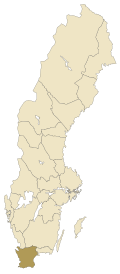
Back بوابة:الدنمارك Arabic Portál:Dánsko Czech Portal:Danmark Danish Portal:Dänemark German Portal:Danimarka DIQ Portal:Dinamarca Spanish Portail:Danemark French Portal:Dinamarca Galician Պորտալ:Դանիա Armenian Portale:Danimarca Italian
Welcome to the Denmark Portal! | ||||

|

|

| |
Denmark is the smallest and southernmost of the Nordic countries. Unified in the 10th century, it is also the oldest. Located north of its only land neighbour, Germany, south-west of Sweden, and south of Norway, it is located in northern Europe. From a cultural point of view, Denmark belongs to the family of Scandinavian countries although it is not located on the Scandinavian Peninsula. The national capital is Copenhagen.
Denmark borders both the Baltic and the North Sea. The country consists of a large peninsula, Jutland, which borders Schleswig-Holstein; many islands, most notably Zealand, Funen, Vendsyssel-Thy, Lolland, and Bornholm; and hundreds of minor islands often referred to as the Danish Archipelago. Denmark has historically controlled the approach to the Baltic Sea, and those waters are also known as the Danish straits.
Denmark has been a constitutional monarchy since 1849 and is a parliamentary democracy. It became a member of the European Economic Community (now the European Union) in 1973. The Kingdom of Denmark also encompasses two off-shore territories, Greenland and the Faroe Islands, both of which enjoy wide-ranging home rule. The Danish monarchy is the oldest existing monarchy in Europe, and the national flag is the oldest state flag in continuous use.
Selected biography

Ludvig Holberg (December 3, 1684 – January 27, 1754) was a Dano-Norwegian writer and playwright born in Bergen, Norway, and is considered the founder of modern Danish literature. He died in Copenhagen. Holberg's works about natural and common law were widely read by many Danish law students over two hundred years.
Holberg was the youngest of six brothers. His father, Christian Nielsen Holberg, died before Ludvig was one year old. He was educated in Copenhagen, and was a teacher at the University of Copenhagen for many years. At the same time, he started his successful career as an author, writing the first of a series of comedies.
Holberg began to study theology at the University of Copenhagen and later taught himself law, history and language. He was not particularly interested in theology as a career, settling for an attestats (similar to a Bachelor's degree today), which gave him the right to work as a priest; he did not attempt a baccalaureus, magister or doctorate in the subject, nor did he follow a career as a theology professor, priest, or bishop.
Holberg was eventually appointed assistant professor after having first worked as one without pay, having to accept the first available position, which was teaching metaphysics. Later, he became a professor and taught rhetoric. Finally, he was given a professorship in the subject which he prized most and was most productive in, history.
Recently selected: Karen Blixen - Bertel Thorvaldsen - Rasmus Rask
Selected picture
Selected article
Scanian was previously classified as a regional language by SIL International, but before the latest update, the Swedish representative to ISO/TC-37, the technical committee overseeing ISO 639, required that Scanian be removed from the ISO/DIS 639-3, the draft just prior to the final draft FDIS, or a positive vote from Sweden would not be forthcoming. The prior identifier ISO 639-3:scy, as used in the Ethnologue 15th edition, is reserved for Scanian, and may become active again if a request is submitted to have it reinstated during the annual review process. Within the previous SIL International classification of Scanian were the dialects in the province of Scania, some of the southern dialects of Halland (halländska in Swedish), the dialects of Blekinge (blekingska in Swedish) and the dialects of the Danish island of Bornholm (bornholmsk in Danish).
Selected place
With a population of 89,071 (1 January 2010), the Kolding municipality is the seventh largest in Denmark. The city itself has a population of 57,197 (1 January 2011) and is also the seventh largest city in Denmark.
Kolding is well known as the location of the former royal castle of Koldinghus which was built in the 13th century. The castle is now a museum and tourist attraction.
Categories
Denmark topics
Things you can do
- Expand stubs:
Geography stubs · People stubs · Denmark stubs in general
Help us extend these stubs and make them real articles!
- Categorize:
Help us categorize Denmark-related articles
- WikiProjects:
Have a look at WikiProject Denmark, WikiProject Faroe Islands, WikiProject Greenland and WikiProject Norse history and culture
- Noticeboard:
Have a look at the Danish Wikipedians' notice board
- Geotag:
Find coordinates for these locations and tag them: articles missing geocoordinate data
Related portals
Northern Europe
Other countries
Associated WikiMedia
The following Wikimedia Foundation sister projects provide more on this subject:
-
Commons
Free media repository -
Wikibooks
Free textbooks and manuals -
Wikidata
Free knowledge base -
Wikinews
Free-content news -
Wikiquote
Collection of quotations -
Wikisource
Free-content library -
Wikispecies
Directory of species -
Wikiversity
Free learning tools -
Wikivoyage
Free travel guide -
Wiktionary
Dictionary and thesaurus
© MMXXIII Rich X Search. We shall prevail. All rights reserved. Rich X Search













